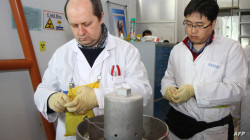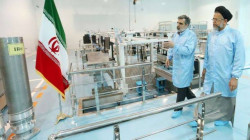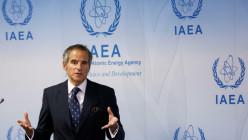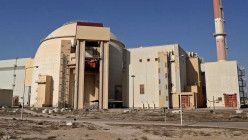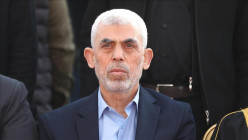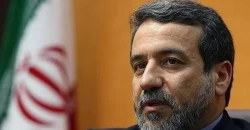Iran Garnering Internal Support for a Potential Nuclear Deal
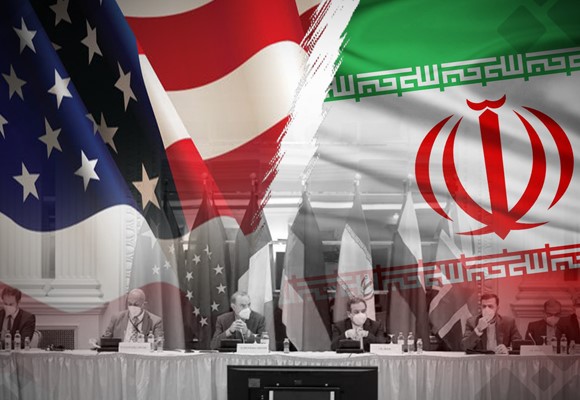
Shafaq News/ Since President Ebrahim Raisi took office last year, Iran has been steadily deprioritizing the importance of returning to the Joint Comprehensive Plan of Action (JCPOA), yet its rhetoric on the matter has shifted in several notable ways over the past week. As negotiators approach another crossroads in the nuclear talks amid reports of a “final draft” circulated by European officials, the regime appears to be preparing its cadres and the wider public for accepting compromise if it becomes politically or economically necessary, whether imminently or down the road.
Latest Activity Points to Familiar Consensus Building
Iranian officials are seemingly following a playbook established in 1988, when the regime had to figure a way out of a long, destructive war with Iraq despite repeatedly declaring that it would fight to the bitter end. Then as now, the goal was to build internal consensus, based on the belief that even an authoritarian system like the Islamic Republic needed to invest some degree of time and resources in justifying its policies domestically. Although the current nuclear negotiations are not as dramatic as that pivotal moment, many of the same mechanisms are evident.
For example, during an August 15 press conference, Foreign Minister Hossein Amir-Abdollahian stated that if the United States showed sufficient flexibility regarding Iran’s comments on the draft agreement floated by the European Union, a deal would be reached in a few days. He also responded to domestic criticism of the draft, explaining that while Majlis representatives were right to point out its supposed flaws, they needed to remember that negotiations entail taking the other side’s considerations and demands into account. Later that day, President Raisi chaired a special Supreme National Security Council (SNSC) meeting to discuss Iran’s official response to the draft, which was sent a few hours afterward.
On August 16, members of the Majlis National Security Committee were briefed by Amir-Abdollahian, SNSC secretary Ali Shamkhani, head nuclear negotiator Ali Bagheri Kani, and Atomic Energy Organization chief Mohammad Eslami. According to the SNSC-affiliated media outlet Nour News, Shamkhani told the representatives that the regime will not retreat from its nuclear redlines. The campaign to garner parliamentary support continued the following day when the same four regime officials attended a closed-door Majlis meeting. Although similar briefings took place earlier this year when a deal was reportedly imminent, the presence of all four officials on the Majlis floor was unusual. In parallel, senior officials have been using media outlets to build internal consensus as well, with Bagheri Kani reportedly briefing prominent journalists about the terms of the emerging deal.
All of these efforts echo the activity documented in the memoirs of the late Akbar Hashemi Rafsanjani, who helped command the war effort in 1988 while simultaneously doing everything he could to end it. According to his diary entries, he sought to convince the rest of the leadership that Iran was in dire straits and could no longer afford to continue the conflict, partnering with then-president (and soon-to-be Supreme Leader) Ali Khamenei to intensively brief the Majlis, the armed forces, and various regime councils and assemblies. They spread the same message to mid-tier regime officials and the broader public, instructing imams to propagate the new narrative in Friday prayer sermons, holding press conferences to explain the logic behind the policy, and coordinating a media effort to portray the war’s outcome as an Iranian victory.
In the end, and despite the risk of backlash from the regime’s most zealously hardline supporters, Supreme Leader Ruhollah Khomeini decided to drink the so-called “poison chalice” by endorsing compromise for the sake of regime survival, while Rafsanjani and Khamenei managed to deflect domestic opposition to the decision. Tehran employed the same modus operandi when compromises were needed during the nuclear negotiations of 2003 and 2015.
What Is the Regime Telling Iranians Today?
Tehran’s latest messaging is focused on three main points. First, it emphasizes that while a deal is within reach, the ball is now in America’s court, and Washington needs to make further compromises. On August 15, a Foreign Ministry spokesman argued that the European draft agreement does not yet meet Iran’s demands despite the relative progress the parties have made, and the Islamic Republic News Agency (IRNA) repeatedly asserted that Washington must make the necessary political decisions. Amir-Abdollahian reiterated this message, noting that the United States must compromise and provide guarantees that the deal will last. Hardline newspapers have made similar arguments. An August 17 article in Javan asserted that Tehran has made it difficult for Washington to say no to the deal. And Kayhan has repeatedly emphasized that an agreement without real U.S. sanctions relief and guarantees would once again bring harm to Iran, urging the government to remember that no deal is better than a bad one. Such messaging may be the regime’s way of hedging against potential future criticism from domestic elements who have pushed for a more pragmatic negotiating strategy. Indeed, former president Hassan Rouhani asserted last month that the JCPOA could have been revived during his tenure if the Majlis had not approved the December 2020 act requiring the government to reduce its commitments under the agreement.
Second, conservative officials and media outlets are praising the negotiators (and, by extension, Raisi’s government) in an apparent bid to deflect any future hardline criticism of the team’s motivation or performance—a stark difference from the treatment Rouhani’s circle received. On August 12, the imam who delivered the Friday prayer service in Tehran called the negotiators an “experienced, revolutionary, and motivated team.” Similarly, President Raisi noted on August 21 that Iran has received a “significant part of its demands” through its “honorable approach.” Even Kayhan—which often lashes out at the nuclear talks—noted on August 15 that negotiators have been careful to insist on Iran’s principles and interests, adding that the current deal is much stronger than the one bargained by Rouhani’s government. To be sure, the newspaper also made clear that the latest draft is still unacceptable. Yet its endorsement of the negotiating team may have been a signal directed at conservative and hardline readers, building the case to continue the negotiations even if no deal is achieved in the coming days.
Third, as in the past, regime officials have been saying that a deal is not a must for Iran and that the country has a “Plan B,” as Hossein-Abdollahian put it on August 15. His deputy Mehdi Safari—who covers economic diplomacy at the Foreign Ministry and previously served as ambassador to Russia and China—likewise told reformist newspaper Etemad that “sanctions are not equivalent to death.” On August 18, the front page of regime-owned conservative newspaper Jam-e Jam touted the argument that Raisi’s active diplomacy has successfully bypassed sanctions. Three days later, the regime newspaper Iran praised the government’s “active energy diplomacy.” And earlier today, a Foreign Ministry spokesman argued that the West needs a deal more than Iran, then declared that the regime would continue its current foreign policy trajectory if no agreement is reached. Kayhan doubled down on this argument, claiming that Iran is in a “superior position” because Washington and Europe are in dire need of its oil.
As for what exactly “Plan B” might entail in practice, prominent Majlis representative Esmail Kowsari warned on August 16 that Iran will increase its uranium enrichment capacity to 190,000 separative work units if need be. (For an explanation of this and other technical concepts, including Tehran’s potential breakout time, see The Washington Institute’s Iran Nuclear Explainer and Nuclear Glossary.)
The Road Ahead
Although Supreme Leader Khamenei has not spoken about the nuclear negotiations for weeks now, this is presumably just his usual tactic of insulating himself from blame if controversy ensues—whether from making compromises or eschewing a quick deal. In all likelihood, every nuclear decision and directive made by the SNSC is being coordinated and approved by him. And for the time being, it remains unclear whether he is willing to make further compromises or prefers to keep foregoing the JCPOA’s benefits in the near term.
By preparing the public for a wide set of alternatives, Tehran’s current messaging could enable Khamenei to postpone the decision if he so desires. Yet this strategy might also backfire given the already worn-out state of Iran’s economy. Recent optimism about the fate of the JCPOA has improved the rial’s exchange rate versus the dollar, but failure to reach a deal (or, at least, maintain the talks) could send Iranian markets into yet another downward spiral.
Source: Washighton Institute
